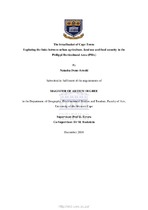| dc.description.abstract | Hunger is more than just a feeling, it is the lack of access to safe nutritious food, which in turn may result in anger towards government, low performance, sadness and a limited will to survive. Urban agriculture has been identified as a source of livelihood for many urban residents and could fundamentally change food insecure cities like Cape Town.
The Philippi Horticultural Area (PHA) is one such place with an enormous amount of potential to assist the City of Cape Town (CCT) to overcome food insecurity challenges. The PHA is the focus of this thesis that aims to determine the impacts that housing and industrial developments in the PHA have had, and might have in the future, on food security in the Greater Cape Town Area (GCTA).
The specific objectives of the study are as follows: (1) To investigate the urban agricultural distribution of the PHA; (2) to investigate agricultural facilitation, people empowerment and the use of land for agricultural purposes; (3) To determine the level of access to food for people within and around the PHA; and (4) To examine the links between the urban agricultural food sector and food production.
Mixed method research was employed, hinging on the Sustainable Livelihoods Approach (SLA) as the conceptual framework. Snowball sampling was used to select 68 participants who were interviewed.
One key finding of the study showed that the PHA had a significant value to the participants, many of whom called the place ‘home’. Another finding is that urban agriculture provides fresh food produce to many local residents. In-depth discussions with officials and farmers, both commercial and small-scale farmers in the PHA, revealed that the PHA is a valuable portion of farmland, and contributes significantly towards food security in and around the PHA. With the use of the SLA as the conceptual framework, the study contributes towards other livelihood outcomes dependant on urban agriculture to improve access, availability and stability of food security within the PHA. Although urban agriculture is a minimal contributor to food security in the PHA, there are other benefits enjoyed by low-income communities such as food aid given by farmers to assist low-income housing communities, educational opportunities to enhance small growers in the PHA, small-scale community garden outreach and employment. | en_US |

